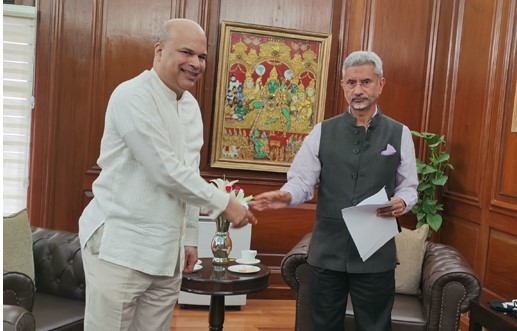Colombo, January 28 (Hindustan Times): India and Sri Lanka have been able to address the impact of a Chinese surveillance vessel’s visit to Hambantota port last year and Colombo is looking to New Delhi to help drive economic recovery through investments in key sectors such as energy, Sri Lankan envoy Milinda Moragoda said.
“We have sort of been able to get over it, but we have to always be vigilant,” he added.
Expressing appreciation for the economic aid of nearly $4 billion extended by New Delhi “without any conditions” for Colombo amid last year’s economic crisis, Moragoda said India had also taken the lead in providing guarantees to the International Monetary Fund (IMF) to help Sri Lanka access a $2.9-billion bailout package.
“In every way, India led the stabilisation and was the bridge to the IMF,” he said. “The reality is that our social explosion would have been much worse and would have been clearly violent if India had not stepped in.”
Sri Lanka is keen on Indian investments in key areas, including renewable energy, especially wind and solar energy in the island’s northwest, development of the Trincomalee oil tank farm as a regional energy hub, and the Sri Lankan government’s planned divestments in telecommunications, insurance and hotels, he said. The framework is being set up for a power grid between the two countries, he added.
A subsidiary of Indian Oil Corporation (IOC) signed a deal with Sri Lanka last year to develop the 850-acre oil storage facility at Trincomalee with a capacity of nearly one million tonnes. Moragoda said storage of fuel at the facility will help Sri Lanka’s energy security and there is also scope for building a refinery with the possible involvement of a third country.
“The tourism sector is low-hanging fruit. We need tourism to get the economy moving quickly. India was the main source of tourists before the pandemic,” he said.
The two sides are also looking at expanding trade through Indian rupee settlements. “India has allowed Sri Lankan banks to open Indian rupee accounts with Indian banks. RuPay would be another possibility for tourism,” he said, adding there was agreement at the policy level on RuPay and technical discussions were on to finalise arrangements.
Moragoda, who recently met National Security Adviser Ajit Doval and Chief of Defence Staff Gen Anil Chauhan for discussions on security issues, said defence cooperation between the two sides has picked up pace. Sri Lanka currently has about 400 military personnel being trained in India, the highest for any country, and work is underway on a floating dock being built at Goa shipyard for the Sri Lankan Navy.
Following the supply of a Dornier reconnaissance aircraft to Sri Lanka last year, the two sides are in negotiations for a second aircraft. India and Sri Lanka are set to hold their annual bilateral defence dialogue during February 23-25 and there is significant cooperation through the Colombo Security Conclave that brings together India, the Maldives, Sri Lanka and Mauritius, he said.
“We should build towards a strategic dialogue. At the moment, the strategic dialogue happens at the political level, but over time it could be more structured,” he said.
Noting that the Yuan Wang 5 episode occurred when there was “an element of dysfunctionality” in Sri Lanka, Moragoda said the continuing dialogue with India helped build trust. “I think we should develop ways of predicting some of these things. There may be other unknowns, may not be a ship. It may be something else, but what is important is an open line of communication, especially in what is essentially an asymmetrical relationship of India and Sri Lanka,” he said.
Hindustan Times – https://rb.gy/r0x5yx



























































